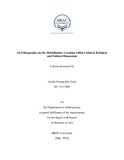An ethnography on the Maizbhandar: locating within cultural, religious and political dimensions

View/Open
Date
2016-05Publisher
BRAC UniversityAuthor
Awal, Arefin Noman BinMetadata
Show full item recordAbstract
With the rise of modernity and worldwide expansion of secularism as the principle of most of the modern states, many presumed that religion and its corollaries will become irrelevant by the twentieth century. But right at the turn of the past century, the world suddenly started to experience violent events that were decisively identified as the expression of religious antagonism. For various reasons such as altered power structure in the Middle Eastern countries, rise of so called 'terrorist' attacks etc., advent of state-sponsored secularism, Islam became the center of discussion world-wide. This newly emerged dynamic has created tensions and struggles between religious groups in new ways. The politics of survival, thus, became an important consideration and challenge within this altered context. With this particular global and regional scenario framing the backdrop, this paper is principally interested in studying a particular religious group called the Maizbhandari. Maizbhandar claims to be a Sufi group, situated in a village of the Chittagong division. In this paper, I zero in on the urgency and dynamics of survival as felt and enacted by the institution of Maizbhandar. (?) I argue that Maizbhandaris' concern with survival centers on a continuous effort to establish themselves as an indigenous version of Sufi Islam while claiming authenticity by drawing a direct connection to the Prophet Muhammad's family drawing a direct connection to Muhammad's family. In order to illustrate my argument, I have organized the analysis in two sections. In the first section, I analyzed the reasoning and justifications that frame them as the only indigenous Sufi tradition in Bengal. Such reasoning are grounded in acts that allow Maizbhandar to have a local following and importance on one hand, and a resemblance with the Baul culture and association with the nation and state politics, on the other. The concept of body and the supernatural activities of the Pirs cut across both the sections because these two function in both ways- serving claims of indignity and supporting the aspiration and epithet of being authentically Islamic.
